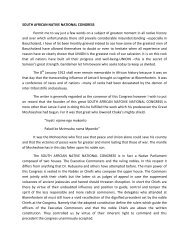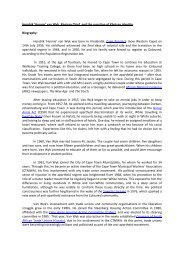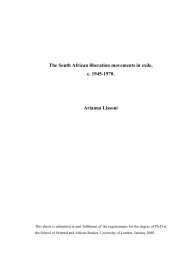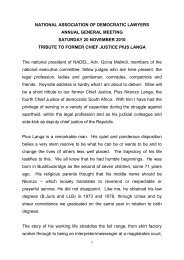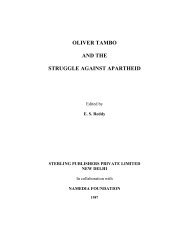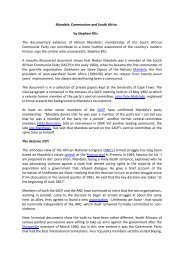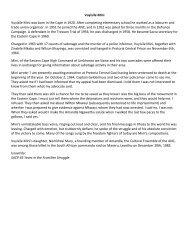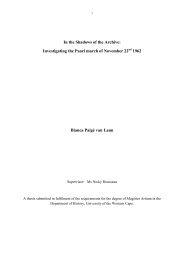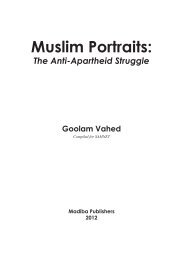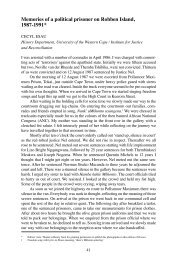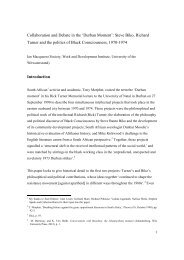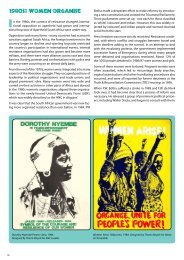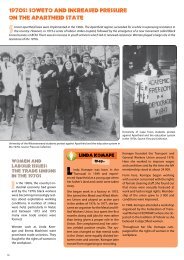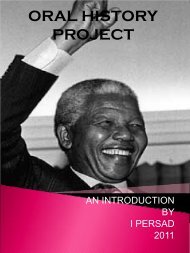Celebrating Women - South African History Online
Celebrating Women - South African History Online
Celebrating Women - South African History Online
Create successful ePaper yourself
Turn your PDF publications into a flip-book with our unique Google optimized e-Paper software.
h<br />
Helen Joseph<br />
1905-1992<br />
elen Joseph was born in Midhurst, Sussex in England.<br />
She graduated from Kings College London in<br />
1927 and went to teach in Hyderabad, India. In 1931 Joseph<br />
came to <strong>South</strong> Africa. During World War II she returned to<br />
England to serve as information and welfare officer in the<br />
<strong>Women</strong>’s Auxiliary Air Force and decided to become a social<br />
worker.<br />
After returning to <strong>South</strong> Africa, Joseph took a job with the<br />
Garment Workers Union (GWU) in 1951. Joseph was also a<br />
founding member of the <strong>South</strong> <strong>African</strong> Congress of Democrats<br />
(CoD), an organisation of whites which was affiliated<br />
to the ANC. She was also a founder of the Federation of<br />
<strong>South</strong> <strong>African</strong> <strong>Women</strong> (FEDSAW) in 1954 and was its national<br />
secretary for a time. With the leadership of FEDSAW,<br />
she spearheaded a march of 20 000 women to the Union<br />
Buildings in Pretoria on 9 August 1956 to protest against<br />
pass laws. Joseph was subsequently arrested and charged<br />
with high treason in December 1956 and banned in 1957.<br />
She was the first women to be placed under house arrest<br />
in 1962 and survived several assassination attempts. She<br />
was diagnosed with cancer in 1971 and her banning orders<br />
were lifted but reinstated for two years in 1980.<br />
During the 1980s, Joseph was instrumental in reviving<br />
the women’s movement within the country and was often<br />
called on to be a keynote speaker at anti-Apartheid rallies.<br />
Joseph gave speeches on the history of resistance organised<br />
at various campuses by the National Union of <strong>South</strong><br />
<strong>African</strong> Students (NUSAS) and was given the position of<br />
Honorary Vice President of NUSAS. In 1983, when the UDF<br />
was launched she was elected Honorary Patron, as her listing<br />
meant she could not hold an executive position, and<br />
participated in many UDF events. In 1984 she gave the<br />
opening speech at the formative conference of FEDTRAW<br />
and was named a non-active patron. Joseph died on 25<br />
December 1992 and her funeral was conducted by Archbishop<br />
Desmond Tutu with the eulogy was delivered by<br />
Nelson Mandela.<br />
Helen Joseph, secretary of the Federation of SA <strong>Women</strong>, arrives at<br />
the Treason Trial, Drill Hall Court, 9 January 1957. Source: Museum<br />
Africa.<br />
Trade Unions: COSATU, 1985<br />
t<br />
here was an unprecedented level of resistance in<br />
factories and black communities in the 1980s over<br />
economic and political issues. In fact, it was a period in<br />
which the highest level of strikes in <strong>South</strong> <strong>African</strong> history<br />
was recorded. In 1982, an average of a thousand black<br />
workers a day went on strike and this trend continued to<br />
increase. Industrial action was undertaken against the<br />
background of low wages and discriminatory labour<br />
practices.<br />
After four years of unity talks between unions who were<br />
opposed to Apartheid and struggled for a non-racial,<br />
non-sexist and democratic <strong>South</strong> Africa, COSATU was<br />
formed on 2 December, 1985. Emma Mashinini, an active<br />
trade unionist from the 1940s, was a driving force<br />
in bringing together various unions under COSATU. At<br />
the time of its establishment COSATU had more than<br />
462 000 members organised in 33 unions, and by 1991<br />
this number had grown to more than 1 258 800. The activities<br />
of COSATU became closely linked to the wider<br />
liberation struggle.<br />
A delegation of women from the Food and Allied Workers Union<br />
participate in the Congress of <strong>South</strong> <strong>African</strong> Trade Unions cultural<br />
day in Johannesburg in July 1987. Source: Jeeva Rajgopaul.<br />
21



